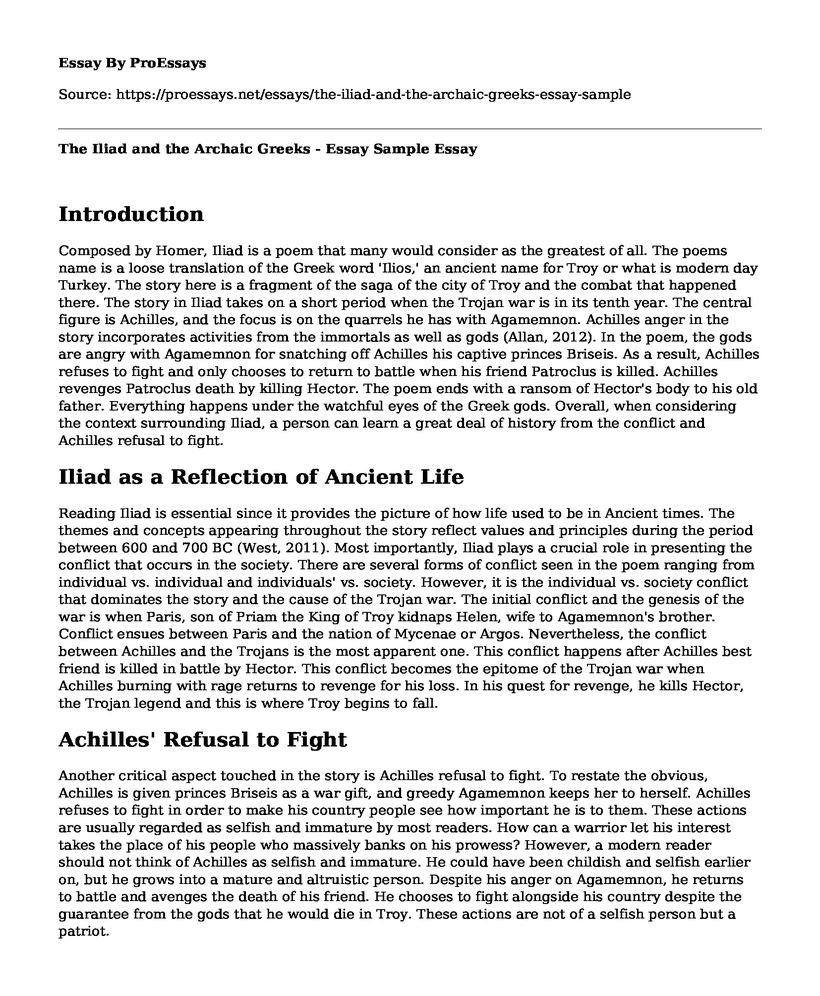Introduction
Composed by Homer, Iliad is a poem that many would consider as the greatest of all. The poems name is a loose translation of the Greek word 'Ilios,' an ancient name for Troy or what is modern day Turkey. The story here is a fragment of the saga of the city of Troy and the combat that happened there. The story in Iliad takes on a short period when the Trojan war is in its tenth year. The central figure is Achilles, and the focus is on the quarrels he has with Agamemnon. Achilles anger in the story incorporates activities from the immortals as well as gods (Allan, 2012). In the poem, the gods are angry with Agamemnon for snatching off Achilles his captive princes Briseis. As a result, Achilles refuses to fight and only chooses to return to battle when his friend Patroclus is killed. Achilles revenges Patroclus death by killing Hector. The poem ends with a ransom of Hector's body to his old father. Everything happens under the watchful eyes of the Greek gods. Overall, when considering the context surrounding Iliad, a person can learn a great deal of history from the conflict and Achilles refusal to fight.
Iliad as a Reflection of Ancient Life
Reading Iliad is essential since it provides the picture of how life used to be in Ancient times. The themes and concepts appearing throughout the story reflect values and principles during the period between 600 and 700 BC (West, 2011). Most importantly, Iliad plays a crucial role in presenting the conflict that occurs in the society. There are several forms of conflict seen in the poem ranging from individual vs. individual and individuals' vs. society. However, it is the individual vs. society conflict that dominates the story and the cause of the Trojan war. The initial conflict and the genesis of the war is when Paris, son of Priam the King of Troy kidnaps Helen, wife to Agamemnon's brother. Conflict ensues between Paris and the nation of Mycenae or Argos. Nevertheless, the conflict between Achilles and the Trojans is the most apparent one. This conflict happens after Achilles best friend is killed in battle by Hector. This conflict becomes the epitome of the Trojan war when Achilles burning with rage returns to revenge for his loss. In his quest for revenge, he kills Hector, the Trojan legend and this is where Troy begins to fall.
Achilles' Refusal to Fight
Another critical aspect touched in the story is Achilles refusal to fight. To restate the obvious, Achilles is given princes Briseis as a war gift, and greedy Agamemnon keeps her to herself. Achilles refuses to fight in order to make his country people see how important he is to them. These actions are usually regarded as selfish and immature by most readers. How can a warrior let his interest takes the place of his people who massively banks on his prowess? However, a modern reader should not think of Achilles as selfish and immature. He could have been childish and selfish earlier on, but he grows into a mature and altruistic person. Despite his anger on Agamemnon, he returns to battle and avenges the death of his friend. He chooses to fight alongside his country despite the guarantee from the gods that he would die in Troy. These actions are not of a selfish person but a patriot.
Conclusion
In conclusion, the Iliad is a vital poem that offers a window into ancient Greece. Through the story, essential themes and concepts can be seen. One of the themes is conflict. Iliad presents conflict at the individual vs. society level. Paris conflicts with Mycenae and Achilles equally conflicts with Troy. Another important message accrued from the story is that Achilles was not selfish. Overall, the narration is crucial in knowing the history of Trojan war.
References
Allan, W. (2012). Homer: The Iliad. A&C Black.
West, M. L. (2011). The making of the Iliad: disquisition and analytical commentary. OUP Oxford.
Cite this page
The Iliad and the Archaic Greeks - Essay Sample. (2022, Jun 04). Retrieved from https://proessays.net/essays/the-iliad-and-the-archaic-greeks-essay-sample
If you are the original author of this essay and no longer wish to have it published on the ProEssays website, please click below to request its removal:
- Fight Club Argumentative
- Is There a War Worth Initiating? - Essay Sample
- Racism in a Raisin in the Sun - Critical Essay
- Character Analysis Essay on Nora From "A Doll's House"
- Algorithms and Data in the Forth Industrial Revolution Essay Example
- Essay Sample on Death's Reality: Emily Dickinson's Reflection on Life and Beyond
- Essay Example on Shays' Rebellion: Farmers vs Gov't in 1786-87







